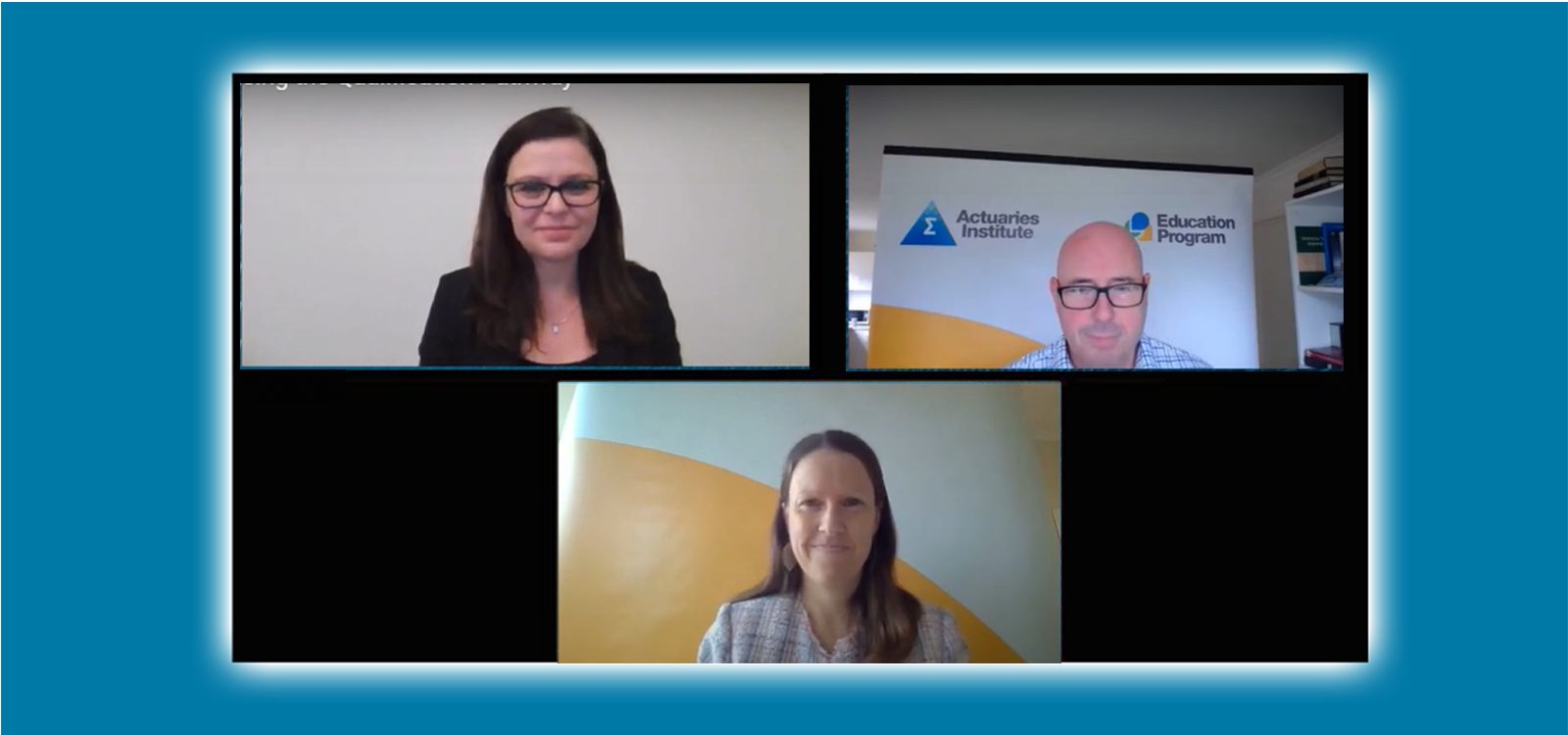Virtual Summit Shorts: Modernising the qualification pathway
Alissa Holz and Mike Callan provided an updated on developments in the Institute’s Education Program at the 2021 All-Actuaries Virtual Summit.
In 2018 the Institute’s Council approved a revamp and rebrand of the Education Program. Alissa (RGA Reinsurance Company of Australia) reflected that, “this is a key project for the Institute, and we have spent quite amount of time over the past three years, updating and reviewing the qualification pathway.”
“In terms of looking at this process, it is important to remember that the qualification pathway is only part of the life-long education journey.”, Alissa emphasised as she begins to provide an overview of the key reasons why the Council adopted a significant pre-qualification education change program:
- Improving quality
- Modernisation
- Additional pathways
- Sustainability and flexibility
- International recognition
Whilst acknowledging the huge effort by education volunteers under the old system, the scale of change could not be completed solely through volunteers. Consequently, Council decided to hire five actuaries to develop and deliver the new program, albeit with significant oversight from volunteers.
Alissa noted the inclusion of additional pathways, sustainability and flexibility and international recognition was needed in the new educational program as it was essential that current and upcoming students can choose traditional fields or others such as risk management and data analytics.
Reflecting on the principles of the Education Program, Mike (Head of Education Development and Delivery) noted that the overarching question for the Program was to understand what a newly junior qualified actuaries looked like.
“They’re not mid-ranking or senior actuaries so they do not have expertise in judgement, but they should demonstrate that they can understand what actuaries do by understanding a business problem and then providing advice to the decision-makers,” Mike explained.
To emphasise the changes in the program, Mike reflected on his personal experience by stating that “Many of us were trained in a classical, statistical approach yet the program is incorporating new statistical techniques which will lead to a better understanding of data science in the profession.’ However, as Mike explained, “Introducing new mathematical techniques does not change the underlying pedagogical approach to create newly qualified fellows. Students need to demonstrate their understanding in English and demonstrate they can create reasonable arguments to back up conclusions.”
The Actuary Program (formerly Part II) has been strengthened by introducing two new subjects – Data Analytics Principles (DAP) and Communications, Modelling and Professionalism (CMP). DAP is taught by our accredited universities and introduces more data analytics in a business environment to undergraduates. CMP not only replaces the previous two-day professionalism course offered by the Institute but gives clear guidance on many communication topics (e.g. report writing, critical thinking) that are required to pass subsequent subjects.

With reference to the Fellowship Program (formerly Part III), there are three modules: two are legislation agnostic and the final module for traditional subjects (Life, GI and Superannuation) tests appropriate understanding of the Australian environment. The introduction of the Module 3 Data Analytics Applications subject creates a new pathway as it tests skills rather than domain knowledge. The CAP subject is effectively embedded in the CMP subjects and the three Fellowship modules as there is an increased emphasis on assignments that tests model building and communication skills.
The development has been guided by the following five ‘Assessment Principles’:
- Equivalence of standards across appropriate actuarial associations
- All learning objective are assessable
- Consistency in syllabus design so that the aim of a subject is linked to student outcomes and the detailed learning objectives
- Consistent mapping of subjects to specified education levels
- Setting an expectation that well-prepared students should pass.
A key change is that we set the student experience at the centre of the design of all aspects of the Program. The new offering to students is closer to a taught distance learning subject. The assessable material has been re-written to produce a staggered learning approach. There is a revamped learning management system that hosts all relevant material in a modularised format. There are numerous tutorials that cover the theory and worked examples. Tutorials also encourage ‘live’ discussion that supplements the active discussion forums. These innovations should assist in meeting the goal of maintaining standards while increasing pass rates.
Concluding the discussion, Alissa discussed the role of governance in the new educational program. Working alongside each other, the Education Strategy Committee and Practice Committees provide oversight on standards and content.
|
Read further Actuaries Digital coverage of the 2021 All-Actuaries Virtual Summit. |
CPD: Actuaries Institute Members can claim two CPD points for every hour of reading articles on Actuaries Digital.







